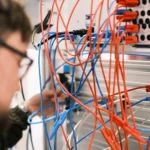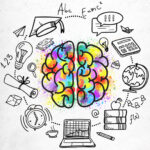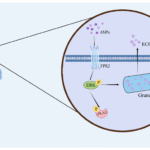Introduction to sleep health and its importance
Blue light and its effects on melatonin production
Blue light is everywhere in our digital world. It emanates from smartphones, tablets, and computer screens. This exposure can significantly disrupt our natural sleep cycle.
Melatonin is the hormone responsible for regulating sleep. When blue light enters your eyes, it sends signals to your brain that it’s time to be alert. This process inhibits melatonin production, making it harder to fall asleep naturally.
Studies show that using devices before bedtime can delay the onset of sleep by hours. Many people find themselves scrolling through social media late into the night without realizing how detrimental this habit can be.
Reducing blue light exposure in the evening may help promote healthier sleep patterns. Consider investing in blue light filters or wearing glasses designed to block this wavelength as part of your nighttime routine. Your body will thank you for prioritizing its needs over digital distractions.
Noise pollution from devices disrupting sleep
The soft glow of screens isn’t the only issue at play. The sounds emitted by our devices can be equally disruptive. Notifications, alerts, and even background hums can interrupt peaceful slumber.
Imagine drifting off to sleep when suddenly your phone buzzes. That jarring noise pulls you back into wakefulness. It’s frustrating and often leads to tossing and turning throughout the night.
Moreover, many people don’t realize how much ambient noise from electronics affects their rest quality. Whether it’s a computer fan whirring or an incoming message pinging, these disturbances create an environment that makes deep sleep harder to achieve.
In our quest for connectivity, we inadvertently invite chaos into our nighttime routine. The continuous barrage of sounds keeps your brain active rather than letting it settle down for restful sleep. Creating a serene sleeping space free from digital distractions is essential for restoring harmony in your nightly rest cycle.
The addictive nature of technology leading to lack of sleep
Many people find themselves glued to their screens late into the night. This habit often stems from the endless scroll of social media, binge-watching shows, or engaging in online gaming.
Technology is designed to capture our attention. Notifications and alerts create a sense of urgency that can be hard to resist. As one more episode plays or another post is read, time slips away unnoticed.
The result? A cycle of addiction where sleep takes a backseat. The lure of instant gratification becomes too strong, pushing aside the body’s natural need for rest.
This pattern not only disrupts sleep schedules but also affects overall health. Mental fatigue accumulates over time, further fueling reliance on devices as coping mechanisms during waking hours.
Breaking free from this grip requires conscious effort and self-awareness about technology’s impact on daily life and well-being.
Sleep tracking apps and gadgets: helpful or harmful?
Sleep tracking apps and gadgets have surged in popularity, promising insights into our nightly rest. They monitor everything from sleep cycles to heart rates, offering a window into what happens while we snooze.
However, the accuracy of these devices can be questionable. Some users find themselves more stressed over their sleep stats than they were before using them. The constant data checking may lead to anxiety about achieving “perfect” sleep.
On the other hand, for some individuals, these tools can promote better habits. By highlighting patterns or disturbances, they challenge users to improve their routines and prioritize rest.
The key lies in moderation. Relying heavily on technology could do more harm than good if it fosters obsession rather than understanding. Balancing insights with intuition is crucial for ensuring that tech enhances rather than hinders our quality of sleep.
Tips for improving sleep hygiene in the digital age
Creating a sleep-friendly environment starts with your bedroom. Keep it dark, quiet, and cool. Consider blackout curtains to block out external light and white noise machines to mask disruptive sounds.
Establish a consistent bedtime routine. Wind down by reading a book or practicing relaxation techniques instead of scrolling through your phone.
Limit screen time at least an hour before sleep. The blue light emitted by devices can confuse your brain’s natural rhythm.
Consider setting tech curfews for yourself. Designate “no-device zones” in the evening to encourage healthier habits.
Stay mindful about what you consume before bed. Heavy meals, caffeine, and alcohol can disrupt restful sleep patterns.
Invest in quality bedding that suits your comfort preferences. A comfortable mattress and pillows can make all the difference in achieving restorative rest.
The impact of technology on sleep patterns
Technology has woven itself into the fabric of our daily lives, influencing how we function even in our sleep. With screens glowing and notifications buzzing, it’s no surprise that many struggle to maintain healthy sleep patterns.
Our bodies rely on natural rhythms to dictate when it’s time to wind down. However, late-night scrolling often disrupts this cycle. The constant stimulation from social media or streaming services keeps our minds active when they should be resting.
Moreover, technology encourages a sedentary lifestyle. More screen time usually means less physical activity during the day, which can lead to difficulty falling asleep at night.
Sleep is crucial for overall health; yet with each beep and notification, technology diverts us further away from restful nights. Finding ways to manage tech use could be essential for restoring that balance needed for quality rest.
Conclusion: finding a balance between technology and quality sleep
Finding a balance between technology and quality sleep is essential for maintaining optimal health. Embracing the digital age doesn’t mean sacrificing your well-being. By being mindful of how technology affects your sleep, you can make informed choices that promote better rest.
Consider adjusting screen time before bed to minimize blue light exposure. Create a peaceful sleeping environment by reducing noise pollution from devices and utilizing features like “Do Not Disturb” modes. Acknowledge the potential addictive nature of tech and set boundaries around usage, especially in the evening hours.
While sleep tracking apps can offer insights into your patterns, remember they should serve as tools rather than sources of stress or obsession. Prioritize good sleep hygiene practices such as establishing a relaxing bedtime routine and keeping screens out of the bedroom when possible.
With some intentional changes, it’s entirely possible to enjoy the benefits of technology while still prioritizing restful nights. Your body will thank you for it with improved overall health and vitality.
Sleep is one of the most critical components of our overall health, yet many people overlook its importance. With busy schedules and constant connectivity, achieving restful sleep can feel like a luxury rather than a necessity. But what if technology, which often keeps us awake at night, could also help us understand our sleep better? As we explore the oneframework 6 ways technology affects your sleep health, it becomes clear that while gadgets and screens pose challenges to our nightly rest, they also offer innovative solutions for improving our sleep quality. Let’s dive into how these two worlds collide and discover pathways to healthier slumbers in this digital age.











